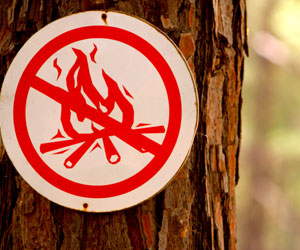 March 16, 2012 – The Wisconsin Supreme Court recently clarified the punishment for willfully or negligently causing a forest fire: double damages plus interest. That spells bad news for a defendant (and insurance companies), who must now pay more than $1 million in damages.
March 16, 2012 – The Wisconsin Supreme Court recently clarified the punishment for willfully or negligently causing a forest fire: double damages plus interest. That spells bad news for a defendant (and insurance companies), who must now pay more than $1 million in damages.
As a favor to land and business owner Jack Scimeca, Jeffrey Knaack lit and maintained a large burn pile of brush, stumps, and building materials at the Lake of the Woods Campground in Marquette County in April of 2003. The fire escaped the pile and burned 572 acres of land.
A jury found that Knaack’s negligence caused the forest fire, and awarded the plaintiffs $568,422 in compensatory damages. Plaintiffs included Heritage Farms Inc., various landowners and their insurers. The defendants included Knaack and insurers, including the insurer for the Lake of The Woods Campground, Markel Insurance Company.
The plaintiffs asked the circuit court to award double damages under Wis. Stat. section 26.21(1), which states, in pertinent part, that “private owners, whose property is injured or destroyed by forest fires, may recover, in a civil action, double the amount of damages suffered, if the fires occurred through willfulness, malice or negligence.”
The statute also allows the plaintiffs to recover reasonable attorney fees, and interest on money judgments is recoverable under section 814.04(4), which was 12 percent at the time of the jury verdict and judgment. [Note: the law on judgment interest has changed].
The circuit court did not award double damages, ruling that circuit courts have discretion under section 26.21(1) to award double damages, and they weren’t warranted in this case. The circuit court noted that Knaack’s conduct did not amount to “gross negligence.”
An appeals court affirmed, rejecting the plaintiffs’ argument that double damages are mandatory once there is a finding of willfulness, malice, or negligence.
But in Heritage Farms Inc. v. Markel Ins. Co., 2012 WI 26 (March 16, 2012), the Wisconsin Supreme Court (6-1) reversed, concluding that a property owner is “entitled to double damages as a matter of course” if a forest fire occurs through willful, malicious or negligent conduct.
The phrase “may recover … double the amount of damages suffered” in section 26.21(1), the court explained, gives a plaintiff a right to seek double damages. It does not give circuit courts discretion to decide whether double damages are warranted, the court noted.
The statute “does not state that the court may award double damages, if the fires occurred through willfulness, malice or negligence,” wrote Justice Annette Ziegler for the majority. “Using that type of language would have been a simple matter, had the legislature contemplated a discretionary award of double damages.”
A different interpretation would run counter to other statutes protecting forest lands and productivity, which consistently impose multiplied damages, the majority explained.
The supreme court also rejected the defendants’ alternative arguments that a decision to award double damages is for the jury to decide, that section 26.21(1) is unconstitutionally vague, and that the court’s interpretation should only apply prospectively.
Interest on jury verdict
The supreme court also ruled that defendants must pay 12 percent interest per year on the double damages amount, about $1.14 million, from the date of the jury verdict, Oct. 13, 2006. At 12 percent interest, the interest on double damages is almost $136,500 per year.
Markel Insurance Co. and other defendants argued that since liability for double damages was in question, interest should accrue starting on the date of the supreme court’s decision. But the supreme court rejected that argument, noting that defendants could have stopped the clock.
“The damages were determinable on October 13, 2006, when the jury awarded Heritage Farms compensatory damages of $568,422,” Justice Ziegler wrote. “Regardless of the outcome on appeal, Markel could have tendered the total doubled amount any time after the jury returned its verdict and thereby stopped the interest from running.”
However, the court ruled that 12 percent interest on attorney fees accrued from the date of the attorney fee award, Nov. 19, 2009, not the date of the jury verdict.
“On the date of the jury’s verdict, the amount of Heritage Farms’ attorney fees and costs was not known or determinable,” Justice Ziegler explained.
The supreme court rejected the defendants’ alternative argument that section 814.04(4) is unconstitutional on its face or as-applied to the defendants.
“[W]hile Markel complains that the 12 percent interest rate is so severe that it tends to deter defendants from properly defending themselves on appeal, Markel fails to explain why a defendant could not protect itself against such a financial burden by simply tendering payment ahead of appeal, before interest accrues,” wrote Justice Ziegler.
Justice Ann Walsh Bradley wrote a lone dissent, concluding that circuit courts have discretion to decide whether double damages should be awarded in cases under section 26.21(1).
Attorneys
Mark Thomsen and Sarah Kaas of Cannon & Dunphy S.C., Brookfield, Clay Dutcher of Dutcher Law Office LLC, Wautoma, and George Curtis and Brian Beisenstein of Curtis Law Office, Oshkosh, represented the plaintiff-appellants-petitioners.
John McCoy and Brian Parish of McCoy Law Group S.C., Waukesha, and Mark Henkel of First Law Group, Stevens Point, represented the defendant-respondents.
Related article
